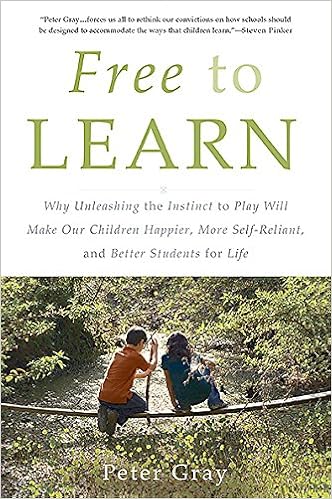Free to Learn by Peter Gray
Chapter 8 - The Role of Play in Social and Emotional Development
Here are some of the lessons that Peter Gray identifies as learned from informal sports play:
1. To keep the game going, you have to keep everyone happy. This means that play is adjusted to account for younger or more inexperienced players (and even adjusted for more experienced players, too). Since players have the freedom to quit, play is adjusted to allow for some success. Players see from others' perspectives and accommodate some of everyone's wants so the game will continue.
2. Rules are modifiable and player-generated. As conditions change, rules are adjusted.
3. Conflicts are settled by argument, negotiation, and compromise. The consensus of players decides parameters of the game, resolves disputes, imparts modifications. This doesn't necessarily mean complete agreement; everyone makes a decision to go along with a decision to keep the game going. (See lesson 1.)
"Kids playing sports informally are practicing many things at once, the least of which may be the sport itself."
4. There is no real difference between your team and the opposing team. "Opponent" is temporary and limited to the game. The team makeup changes from game to game (and sometimes within a game). In the end all are part of the same group.
5. Playing well and having fun are more important than winning. Stretching skills, enjoying the game, playing together - these are the goals of an informal game.
Children use play - pretend play and game play - to make sense of their environment, whatever that environment may be. They develop self-control, negotiation, compromise, empathy through play. Their play takes on what is happening around them so they can prepare themselves for what they will face as they get older.
"Dangerous" play is an important part of the child's experience. Kids will climb high, jump off things, perform tricks on playground equipment, play fight, and chase one another. This play has an element of risk and an element of fear to it. "In such play children must be in charge of their own activities, because only they know how to dose themselves with the right amount of fear." We often underestimate their ability to make good judgments about this type of play and to protect themselves during "risky" play.
I love Teacher Tom's writings about this topic. Many of his posts echo the idea that children know their own limits. They will push to their own edge and then pull back. But each time they are building confidence and skills to go a little further. (If you haven't read his post Brave, check it out.)
As I read this chapter, I was reminded of David Elkind's writing (in The Power of Play) that game play is learning to be a part of society. I think that Peter Gray makes some similar points here. But I think that one of the last points in the chapter was very telling. Peter Gray posits that the decline of empathy (connecting emotionally with others) and the rise of narcissism (inflated view of self) could be traced back to unsupervised, child-directed play with peers. Are we losing the give-and-take, consensus view of society because kids are not allowed to play freely anymore? It's certainly an interesting (and frightening) question to think about.



